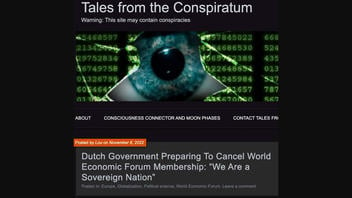
Is the Dutch government planning to cancel its membership in the World Economic Forum, the Swiss-based international public policy organization? No, that's not true: The claim is based on a press release by a radical-right opposition party in the Belgian region of Flanders, not the Netherlands. The release says Flanders' leadership wants to tighten cooperation with the WEF, not withdraw from it. Moreover, governments are not even eligible for membership in the WEF, a spokesman for the organization told Lead Stories.
The claim appeared on a website called Tales from the Conspiratum on November 8, 2022, under the title "Dutch Government Preparing To Cancel World Economic Forum Membership: 'We Are a Sovereign Nation'" (archived here). It opened:
The Dutch government is considering proposals to cancel its membership in the World Economic Forum due to the globalist organization's anti-democratic views.
The article then immediately debunks its own claim when it explains that the government under discussion is in Flanders, and the demand to exit the WEF came from the Vlaams Belang (Flemish Interest) party, which is not a member of the governing coalition:
The Flemish conservative party, Vlaams Belang, is pressuring the government to cancel its World Economic Forum (WEF) membership. This year, the Flemish government will pay a whopping EUR 200,000 in membership fees to the WEF and approximately EUR 27,000 as a participation fee in their annual meeting in Davos.
Contrary to the article's title, Flanders is not a "sovereign nation," but rather one of three regions in the Kingdom of Belgium.
This is how the article appeared at the time of writing:
Dutch Government Preparing To Cancel World Economic Forum Membership: "We Are a Sovereign Nation"
In a press release by Vlaams Belang, Flemish Member of Parliament Sam van Rooy stated that the Flemish government is legitimizing and subsidizing a worldwide lobby organization that is openly pursu...
(Source: Screenshot taken Fri Nov 11 at 11:15:30 2022 UTC)
Tales from the Conspiratum is a blog that carries the disclaimer "Warning: This site may contain conspiracies" in its page heading. Its story on the Dutch government leaving the WEF is a rehash of an article published by RAIR Foundation USA on November 7, 2022. That article appeared under the more accurate title "Flemish Conservative Party Demands the Government Cancels its World Economic Forum Membership" at the time of writing, though it still used "Netherlands," not "Flanders," as one of its topic tags above the headline.)
RAIR derived its information from a press release that Vlaams Belang published on November 3, 2022, that accuses the administration of Flemish Minister-President Jan Jambon of being "insufficiently transparent about WEF membership and [its] influence on policy." (Translations by Google Translate.)
Vlaams Belang asks why Flanders is spending 175,764 euros ($181,786) a year on "membership" in the WEF, plus an additional 27,300 euros ($28,235) to participate in the WEF's annual meetings in the Swiss Alpine resort of Davos. The party says that Jambon
wants to further strengthen the cooperation with the WEF in the coming period. According to Jambon, 'the mission of the World Economic Forum is to improve the state of the world,' but that mission turns out to be politically correct and woke: The WEF has an ideological agenda of inclusion, diversity, open borders, and climate and CO2 hysteria. Jambon claims that 'the WEF is not asking us to pursue a specific agenda,' but he adds that his 'participation in the Davos meeting may result in policy initiatives.' It therefore seems very likely that the Flemish government is following the globalist objective of the WEF as much as possible in exchange for access to the WEF network of multinationals, banks, journalists and NGOs.
The release concludes by asking the Flemish government to "cancel the Flemish payment for WEF membership."
It is not clear to what kind of "membership" Vlaams Belang is referring. Governments cannot be "members" of the WEF, Yann Zopf, the organization's head of media, told Lead Stories in a telephone interview on November 11, 2022. "Members are only companies," he said. "It can be that a government is involved in an initiative around, say, climate. But they are not members."
The WEF's website lists the government of Flanders as a "partner" in a platform called "Shaping the Future of Trade and Investment," which seeks to accelerate economic reform "through a proven mobilization process to advance recovery, growth and sustainable development."
Lead Stories has asked the government of Flanders' press representative for comment, and will update the story if he replies.
The WEF has become an object of controversy as protesters and politicians, usually hailing from the right side of the political spectrum, accuse the organization of using its influence to force national governments to enact unpopular reforms, especially in relation to climate change policy.
In a tweet on July 17, 2022, Dutch politician Thierry Baudet accused the WEF of complicity in the Dutch government's plan to slash greenhouse emissions, which ignited weeks of protests by Dutch farmers, who said the proposed restrictions would threaten their livelihood. In another tweet on July 27, 2022, Baudet compared WEF Chairman Klaus Schwab to "Darth Vader." He also wrote that Dutch Prime Minister Mark Rutte, who is in the WEF's Young Global Leaders program, sought to "demolish the farmers" and force people to "eat bugs."
Additional Lead Stories fact checks of claims about the WEF can be found here.

















